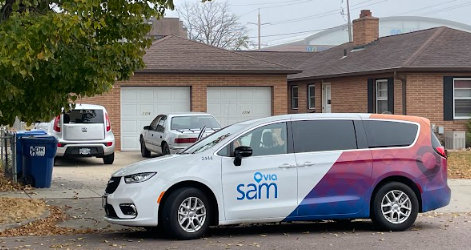ASA rolls out Phase II of transportation model updates

The Augustana Student Association announced the second phase of its transportation updates which eliminated the SAM (Sioux Area Metro) On Demand portion of the program and provides four more Lyft passes this semester, in addition to the eight already provided to each student using the program. Lyft passes reduce the cost of rides by $10.
In ASA’s first phase of updates, students had unlimited free rides through SAM On Demand. In September and October, ASA did not have to pay for these monthly passes. However, moving forward, ASA would have to pay $30 per student per month for unlimited SAM On Demand rides.
At $1.50 per ride, students would have to take over 20 rides per month to make the $30 monthly pass cost-effective. While students will no longer have free unlimited rides, they can still use SAM On Demand at its standard $1.50 fare.
“Students aren’t doing enough rides in a month to fulfill that $30,” said ASA President Annie Johnston. “It just made more sense from a financial standpoint and accessibility standpoint to add more Lyft passes and roll back on the SAM passes.”
As ASA continues to evaluate transportation solutions for students, sophomore Chilotam Okafor shared her appreciation for the program throughout the updates.
“I was always scared that with increasing costs, because they were always talking about how Lyft was expensive, I was just going to come next semester and the program was going to be scrapped,” Okafor said. “It’s really, really good how the program has been upheld and they’ve just been very innovative with changes.”
The elimination of SAM On Demand and the reduction in Lyft passes from last year are part of ASA’s efforts to reduce rising transportation costs. So far, ASA’s changes have cut the transportation budget in half – from $60,000 last year to $30,000 this year.
“We’re trying to make it so we don’t have to have such stringent budget situations,” ASA treasurer Noah Everson said. “That way we are able to more freely spend on things that are giving back to all of the students on campus and promoting campus community.”
While these changes have helped ASA balance its budget, Johnston believes the responsibility for providing transportation shouldn't fall solely on student government
“If we want efficient and successful transportation for students on campus that don’t have access to cars, that should be shouldered by the university, not by the student government on campus,” Johnston said. “The purpose of it is great, and I think ASA should continue to invest in transportation, but ideally, it would be in partnership with the university, so it’s not entirely on us.”
While neither ASA nor the university have announced any concrete plans, Augustana is collaborating with class of 2022 alumnus Taha Afzal to develop a rideshare app called Uni Go.
Uni Go would let university students with vehicles list upcoming rides on the app and set a custom price per seat. Students without vehicles could browse these listings to find rides that fit their schedules or request a ride.
During beta testing, students would have to pay with cash, though Afzal plans to integrate payment platforms like Venmo and PayPal after beta testing. The app would initially be available only on iOS, with plans to integrate Android support in the future.
Afzal first approached President Stephanie Herseth Sandlin about developing Uni Go for Augustana this summer, but the project dates back to 2020, when Afzal and a team of two other students developed Ridesio for a coding competition, CodePath.

“We’re definitely in the final stretches of getting approval for the beta and securing the funding.” Afzal said. “While I wait for those things from Augustana’s end, I am continuing to work on adding more features and making sure everything is defined and easy to understand and use.”
Herseth Sandlin explained that the university has not decided whether or not to move forward with beta tests, as the plan is largely contingent on the available budget.
If Augustana invests in developing the app, beta tests may begin as early as next semester.
Taking into account savings from the transportation updates, ASA now has a total balance of $32,000. Of that, $22,000 will be spent on projects like the ASA executive strategic plan, which could fund student-led projects or bring back the UBG Big Event, which was suspended in 2020. The remaining $10,000 will go into savings.



